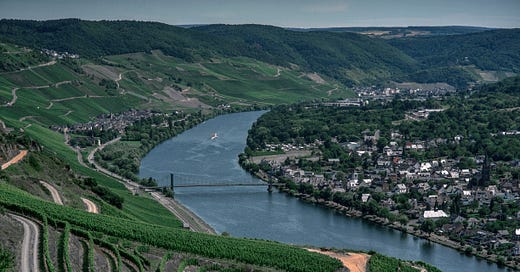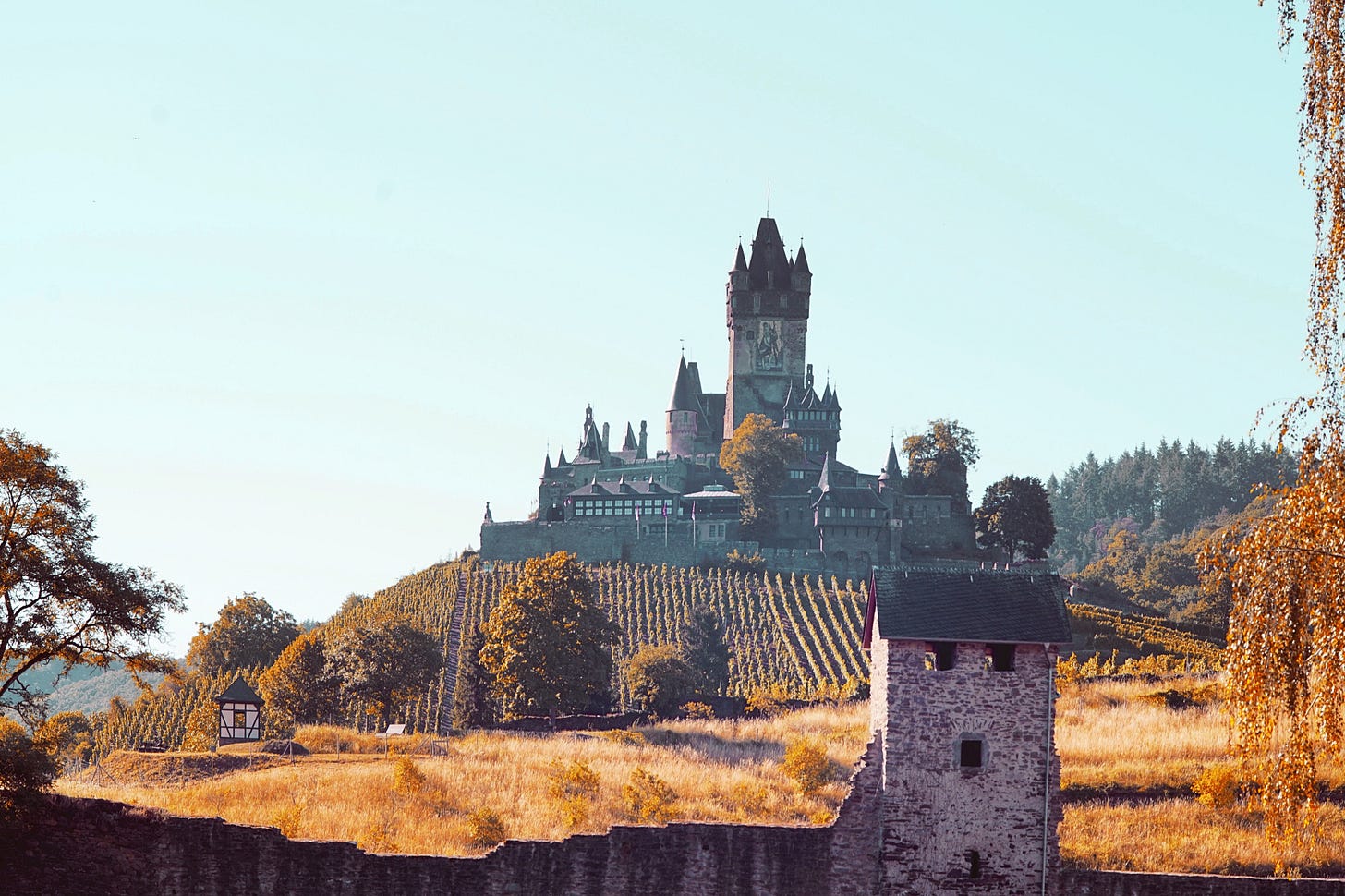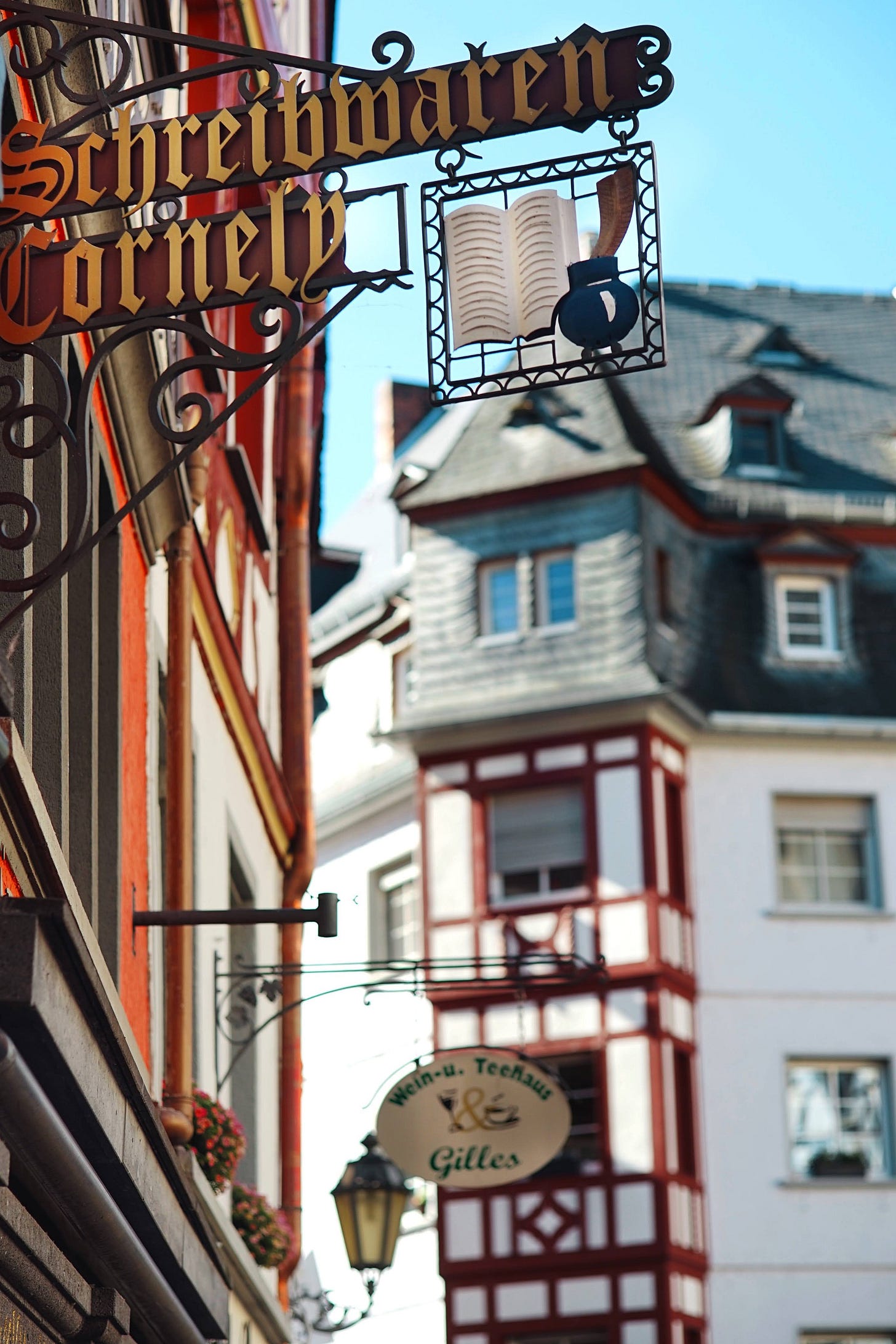gentle reader, you just opened an all new edition of enda lettere, a bi-weekly musing about long-dead poets, wine, and walking. i’m Nora, and if you are new here (and some of you are!), head to the carefully tucked-away ‘about’ page, it explains some anomalies. and then let’s go for a walk.
i keep looking at the photos and feel trapped by the same double-edged enchantment. it has a perplexing quality, like an optical illusion warping the horizon. what i see is true, what i see is what my camera-eye, this peculiar amalgamation of my mind’s eye and the ancient Zeiss manual lens i had chosen to take vacation photos with, saw back then. a landscape of utmost pictorial harmony—the camera-eye never really sought a composition, it just took note of the composition diligently designed and erected by generations of dreamers. for locals and invaders alike had dreamt: of wealth, of the blessing of their gods, of ripe grapes, cloudless skies, an empire. and when they had everything, they turned to each other and asked: what should we do with the coin now? and they built. they built chapels and castles and quaint towns, favoring the valley floor, abandoning the ancient settlements of the hilltops. they built the splendidly hideous Porta Nigra and luxurious baths, serene summer houses, wells, red-and-white half-timbered houses in a quasi-expressionist manner, and these days they build whimsical huts, look-out platforms and BBQ areas, or painstakingly reconstruct what the middle ages had swept away.
the bridge connecting Wehlen and seemingly, no man’s land—in reality the suspension bridge allowed winemakers access their vineyards below the Graacher Schäferei directly.
one of the most notable of the dreamers was Jodocus Prüm, the 12th son of a wealthy family in the town of Wehlen. loss, grief, and an unknowable darkness characterized his childhood: he lost his parents and half of his siblings. the remaining un-married brothers handed young Jodocus around, trying their best to raise him. growing up to be a pious, benevolent, and charitable man, Jodocus dedicated his entire life to social projects. in 1842 he commissioned the sun-dial of Wehlen (Wehlener Sonnenuhr), a seemingly mystical emblem of the town, and the entire Mittelmosel region. but there was nothing fanciful or whimsical about a sun-dial: in the treeless, slate-covered hillside the primitive clockwork is visible from miles away, and the vintners working the plots above Graach only need to seek out the sun-dial in Wehlen to know what time it is—in the middle of the 19th century that was a small, yet important community-minded innovation. but Jodocus Prüm went further, and commissioned communal wells in Inkart, a hamlet of Wehlen, and up on the Mooskopf, one of his family’s plots. he also funded the renovation of cloisters and chapels in his hometown and Bernkastel.
the sun-dial of Pommern. one of many in the region.
reimagined celtic idol on the Pommerner Mart.
what motivated him, i wonder, to practically give away his wealth? the building of wells to supply the townspeople with fresh water is an especially touching gesture. for the green glare of the summer sun transforms the valley: clear summer days are unbearable in this living, roaring furnace, like the day i climb the stone steps in Bernkastel, trying to reach the copse above the vineyards in the hopes of walking under the canopy for a while. a well with cool water is indeed the greatest gift for those, who spend their days among the neat rows of the treillage under the merciless sun, and Jodocus Prüm had had the welfare of the people on his mind.
bachelordom ran in his family, for only one of his brothers had ever married, and only one of Sebastian Alois’ six sons had a family of his own—but a singular talent also ran in the family, an attunement to the soil, the grapes, and that merciless sun above the river: it is the brother who became the forefather of the lineage of the greatest winemakers of Wehlen and Bernkastel, who gave the Mosel Rieslings that refined, crystal clear expression which endures to this day. the founders of the houses Joh. Jos. Prüm, Dr. Loosen, Robert Weil, Pauly-Bergweiler, Studert-Prüm are all his descendants.
no need to ‘compose’. the view from Maria Zill above Bernkastel.
Germany’s most expensive lage (plot): the Bernkasteler Doctor, named after a legend of a doctor healing with wine.
for a long time i did not understand these delicate Mosel whites, low in alcohol, high in acidity, an intense smell of petrol on the nose. young, bone-dry Rieslings are quite offensively plain—for me this meant lacking playfulness and complexity. in a tasting organised by a friend, a studious sommelier, i was the one who hated every single sip, for my mind was unable to make the necessary connections and understand what the Mosel tradition was about. i earned only endless teasing for being nitpicking, but my conflicted relationship with these whites persisted, until i tried some extraordinary examples. for the vexing traits of low alcohol and high acidity had been a problem for local winemakers indeed, and they soon discovered the benefits of chaptalisation, or adding sugar to the wine in the making. modern tastes almost always veer towards drier expressions, but with Mosel whites a slightly off-dry wine truly makes the difference. sweetness is not something to scoff at—it is the balancing characteristic which placates high acidity, elevates low alcohol, and helps minerality take the lead. thus, in every outstanding Mosel white in the unique, green hock style bottle, we witness the alchemical marriage.
the sacrifice must be made for the otherworldly quality of the wine: grapes are grown on some of the steepest slopes to give them ample horizontal irradiation during the day. and the power of the sun is vast, i can feel that on my skin as i move through the treillage of the Graacher Schäferei. by the time i reach Zeltling, my calves have turned a deep, irritated purple, and i can hardly see from a sun-induced vertigo. a single glass of friendly pinot blanc knocks me out and i spend the rest of the afternoon sleeping on a bench, freed from the burden of thinking.
the ruin of Coraidelstein, Klotten.
the view of “friendly winemaking town” Klotten
but there is an anxiety lurking beneath my sun-drenched fascination. one must not get too close to a landscape like this. better let the feet and the eye wander, i keep telling myself. for a look too long, and the remains of the past would ensnare me. better keep my position in this space sufficiently relativized, i caution myself, before i become part of the optical illusion, before i become one with a warped horizon. for the Mosel-valley is like a purpose-built historical tableaux, illustrations from a fairy tale book. a wrong turn, a slightly longer glimpse of a reimagined idol and i won’t be able to stay in the present, for the layers of the centuries are many.
so i resort to coping mechanisms and return to the soothing image of the fool, a poet. there is a patio above the town of klotten—just below the picturesque ruin of Coraidelstein. there is something deeply unsettling about the convivial atmosphere the welcome signs dotting the steep hillside try to convey. unkempt vignettes threaten to tumble down on the heap of white-washed houses—an assault of a primitive, alien army. feet dangling, i sit on a bench and make up a persona for myself: i am Jakob von Fuglsang, author of what some would consider sentimental trash, fool of love, enamored with the call of the lark and the nightingale. Jakob von Fuglsang tries to see the world, seeking inspiration to sing songs to the moon and the rising mist. He is a well-read lad and thinks of a long poem he knows by heart, the one composed by Ausonius.
perfectly romanticist Reichsburg Cochem from a distance
designed to medieval perfection, Cochem
Ausonius was born in Bordeaux in an established, land-owning Gallo-Roman family. He wrote with considerable bitterness about them and his upbringing later. Nevertheless, he enjoyed excellent education and accompanied his uncle to Constantinople to make a splendid career and see the empire for himself.
He became the tutor of Gratian, the son of Valentinian I and was part of the emperor’s entourage on his German campaign in 368. He composed what is considered his best work, the poem about the Mosel, which goes in painstaking detail cataloguing the fish thriving in the river. More interesting, however, is the way he describes the sweltering heat of summer days—Jakob von Fuglsang smirks and nods knowingly, wincing at the touch of his sun-burnt calves and neck.
“Thence onward I began
a lonely journey through pathless forest, nor did my
eyes rest on any trace of human inhabitants.
I passed Dumnissus, sweltering amid its parched fields, and
Tabernae, watered by its unfailing spring, and the
lands lately parcelled out to Sarmatian settlers.
And at length on the very verge of Belgic territory
I descry Noiomagus, the famed camp of sainted
Constantine. Clearer the air which here invests
the plains, and Phoebus, cloudless now, discloses
glowing heaven with his untroubled light. No
longer is the sky to seek, shut out by the green
gloom of branches intertwined:
of transparent day withholds not sight of the sun's
pure rays and of the aether, dazzling to the eyes.
Nay more, the whole gracious prospect made me
behold a picture of my own native land, the
smiling and well-tended country of Bordeaux the
roofs of country-houses, perched high upon the overhanging
river-banks, the hill-sides green with vines,
and the pleasant stream of Moselle gliding below
with subdued murmuring.”
Alken and the view of Castle Thurant
inexplicable.
Jakob von Fuglsang leans against the railing and keeps squinting at Thurant Castle, and knows in his foolish heart that nothing really changes. the sun’s pure rays and the roofs of country-houses, and the pleasant stream of Moselle are all the same. the river, this snaking mythical beast, its back arching in an elegant line, sometimes a dull tobacco brown, sometimes pewter, but from a distance invariably a deep victoria blue with a silver sheen, is lazy and regal, unchanged for millennia. “no rush,” the water says, “i’ve been here for millions of years, what is one hot summer day more?”
nothing really changes, but all walks inevitably come to an end. i abandon Jakob von Fuglsang in Güls, this quaint suburb of Koblenz; i walk between cottages and orchards in perfect peace, foolish, sun-burnt, and tipsy.
thus ended my unnecessary vacation at the Mosel. i have been dealing with the sun-damage for a long time and haven’t had a good Riesling ever since. maybe it’s time to open a bottle and plan for real adventures? who knows.
until next time, wishing you light steps,
n.














